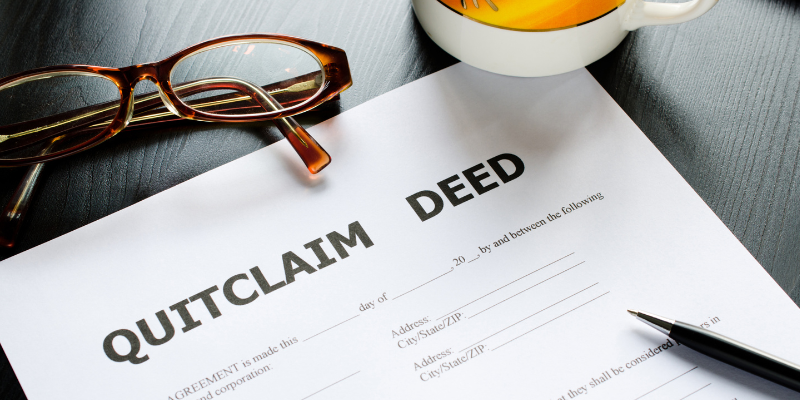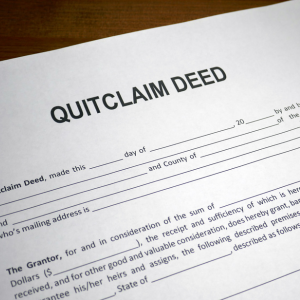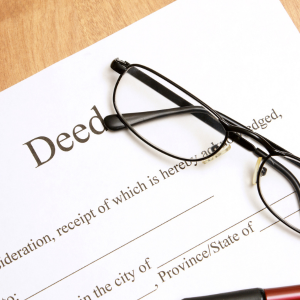
Filing a quit-claim deed in Alabama doesn’t have to be complicated. With help from North Alabama House Buyer, you’ll get clear guidance on what to do, what to bring, and how to get it done right the first time.
How to File a Quitclaim Deed in Alabama: A Step-by-Step Guide
Like any other state in America, Alabama requires that you comprehend the steps and the legal processes needed to file a quitclaim deed. If you are settling ownership issues and transferring property deeds to family for the sake of convenience, knowing how to legally handle the processes is very important.
Gathering Necessary Documents: Property Deed & Legal Description
Go through all documents that include the following, as they are necessary, before filing a quitclaim deed:
- Property Deed: Obtain a current deed to ascertain who the current holders of the property are.
- Legal Description: You need to get a legal description from the county assessor’s records to ensure that it is painstakingly documented.
- Checklist: Keep all files, such as real estate assessment maps and charts, organized with the help of a comprehensive, accurate document checklist.
Understanding Alabama’s Quitclaim Deed Requirements: Signatures, Witnesses, and Notarization
Every state in the US has different legal standards governing the filing of a deed. To avoid any legal trouble, it is a good measure that you adhere to the following Quitclaim deed standards:
- Signatures: Every filing must come with the signatures of both parties to whom a bound document is provided.
- Witnesses: Every filing must be attended to by at least two witnesses that a bill of the document has been sighted by.
- Notarization: The deed needs to be signed by a public notary who bears witness to sign his or her name on the official documents to confirm it is a valid filing.
Having an attorney can help clear up any worries about legal documents and ensure a smooth filing process with no issues. For example, if you want to sell your Scottsboro, AL house faster, an attorney can help guide you through the process.
Locating the Correct Quitclaim Deed Form for Your County
Finding the right quitclaim deed form specific to your county is important:
- Online Resources: Many counties provide forms on their official websites, which you can access online.
- Court and Probate Office: If online access is not available, visit your local probate court or courthouse to get the correct form.
- Ensure Accuracy: Double-check that the form meets your county’s legal requirements to prevent filing delays.
Need help with a quitclaim deed or other real estate questions? Contact us at North Alabama House Buyer. We’re here to make the process simple and stress-free.
Finding Your Alabama Property’s Legal Description
Knowing your property’s legal description in Alabama is key for real estate deals and assessments. This document shows the exact details needed to identify your land. Whether buying, selling, or assessing property, you need to know how to find and understand this information. Legal descriptions are important parts of property records and can be found in different documents and maps related to Alabama real estate.
Accessing Property Records Online: County Assessor Websites and Resources

In Alabama, you can easily find property records on county assessor websites. These online tools help you look up public data and check details about your property’s legal description. Here’s how:
- Visit the County Assessor’s Website: Each county has its own website. Go to the one for your property’s location.
- Search for Public Records: These websites usually have a search tool. Enter the property ID or owner’s name to find records.
- Check Available Information: Once you find your property, review the data. It might include maps, assessments, and the legal description.
By accessing these records online, you get the most current details about your property, helping you make smart decisions, whether you’re looking to sell your Athens, AL house faster or in nearby cities, or connect with potential buyers.
Dealing with Uncertain or Inaccurate Legal Descriptions: Solutions and Next Steps
If your Alabama property’s legal description seems uncertain or wrong, here’s what to do:
- Assess the Situation: Figure out why the description is unclear or incorrect. It could be a simple mistake or something more complicated.
- Consult a Specialist: Talk to a real estate lawyer or survey expert. They can give advice on fixing the problem.
- Correct and Rectify: Work with the right authorities to fix the legal description in the official records. This might mean re-surveying the property or submitting a correction request.
- Follow Up and Confirm: Make sure changes show up in all needed documents and confirm accuracy with the county assessor.
Taking these steps will help fix any issues and ensure your property’s legal description is correct for future dealings.
Why Accurate Legal Descriptions Are Crucial in Quitclaim Deed Filings
Having an accurate legal description is crucial when filing a quitclaim deed in Alabama. Here’s why:
- Ensures Validity: A correct legal description is needed to validate the ownership transfer through a quitclaim deed. Without it, the deal might become invalid.
- Facilitates Property Transfer: A correct description ensures the smooth transfer of property ownership, avoiding disputes or legal issues.
- Protects Parties Involved: Both sides in the deal are protected when the deed accurately describes the property. It lowers the risk of misunderstandings about boundaries or size.
Because of these reasons, checking the legal description before submitting a quitclaim deed is essential. Accuracy helps keep the deed valid and enforceable.
By knowing these aspects and using available resources wisely, individuals can handle Alabama property records with confidence.
Determining Recording Fees and Taxes in Alabama
When dealing with real estate transactions in Alabama, knowing the recording fees and taxes is important. Each county in Alabama may have different requirements for these costs, which are essential for legal property payment procedures. Understanding these fees helps you stay compliant with Alabama real estate law.
County-Specific Recording Fees: Researching Current Rates and Potential Variations

Recording fees in Alabama can vary between counties. To determine these fees:
- Research Current Rates: Visit your county’s courthouse or official website to get the most updated information on document filing costs. Courthouses usually provide lists of fees for different document types.
- Understand Rate Variations: Recognize that fees might differ based on the type of document you are filing. Some counties may charge more for certain documents, like deeds or mortgages.
- Document Requirements: Be prepared with all necessary documents before going to the courthouse to avoid extra charges or delays.
By being informed about county-specific recording fees, you can better manage the costs of your real estate transactions.
Additional Taxes and Fees: Understanding Potential Costs Beyond Recording
Beyond recording fees, there are other taxes and fees to consider in Alabama real estate:
- Real Estate Taxes: Depending on your property and its location, you might need to pay various real estate taxes, which can have a big impact on your finances.
- Legal and Financial Implications: Some countries charge additional fees for legal processes or financial transactions. These might include transfer taxes or special assessments.
- Budget for All Costs: When planning your real estate budget, include potential taxes and fees to avoid unexpected expenses.
Being aware of all possible costs ensures a smooth transaction process and helps with financial planning.
Methods of Payment: Paying Recording Fees and Taxes in Your County
It’s important to understand how to pay recording fees and taxes in your county:
- Accepted Payment Methods: Most courthouses accept cash, checks, or credit cards. Confirm the preferred method with your local courthouse before visiting.
- Payment Procedures: When you go to the courthouse, be ready with the exact amount needed. Check if different payments can be combined or if separate transactions are necessary.
- Online Payments: Some counties offer online payment options for convenience. This can save time and ensure timely payment of your fees.
Knowing the payment procedures helps make handling real estate transactions in Alabama easier.
For help with real estate transactions in Alabama, consider reaching out to us. We’ll guide you through recording fees and taxes, and how our process works is designed to ensure a smooth, stress-free experience every step of the way.
Filing Your Quitclaim Deed: The Alabama County Probate Court Process
In Alabama, a quitclaim deed is a straightforward way to transfer real estate. Knowing how the county probate court process works is key to filing your quitclaim deed properly. This section will guide you through the process.
Submitting Your Deed: Step-by-Step Instructions for Your County Probate Court
Here’s how to file your quitclaim deed in Alabama:
- Prepare Your Documents: Make sure you have all the necessary documents. You need the original quitclaim deed with notarized signatures and any other forms your county requires.
- Check County Requirements: Each county might have different filing rules or fees. Visit the probate court’s website or call them for specifics.
- Visit the Probate Court: Bring your documents to the probate court in the county where the property is located. Some places let you mail them in instead.
- Pay Filing Fees: You’ll need to pay a filing fee, which varies by county. Know the amount beforehand to prevent issues.
- Obtain a Receipt: After submitting, you’ll get a receipt or confirmation of submission. Keep this as proof of filing.
Processing Times: Expected Turnaround Times for Quitclaim Deed Filings
Once submitted, the time it takes to record your quitclaim deed can vary. Generally, expect the following:
- Standard Processing: Most deeds are recorded within 2-4 weeks.
- Expedited Services: Some counties offer faster recording for an extra fee, reducing the time to about a week.
- Delays: High volume or incomplete submissions might cause delays.
Confirmation and Receipts: What to Expect After Filing Your Deed
After your quitclaim deed is processed:
- Confirmation Notice: Expect a notice confirming your deed is recorded.
- Document Copies: Get certified copies of your recorded deed from the probate court for your records.
- Proof of Filing: Keep all receipts and confirmations as proof of filing, which can be important for future real estate dealings.
Understanding how to file a quitclaim deed in the Alabama county probate court helps make the process smooth and efficient. For further help, reach out to North Alabama House Buyer for expert guidance.
Post-Filing Procedures and Important Considerations
Verification of Recording: Methods to Confirm Proper Recording of Your Deed

After you file your deed, it’s important to check that it has been recorded properly. This makes sure your property document is legally valid. Here’s how to confirm your deed’s recording:
- Visit the Local Courthouse: Look at the courthouse records to see if your deed is listed.
- Online Record Search: Many counties let you search public records online. Use this to find your deed.
- Request a Confirmation: Contact the probate office or the recorder’s office to confirm your deed is recorded correctly.
- Hire a Professional: A real estate attorney or title company can ensure the process is done right.
Consequences of Improper Filing: Potential Issues and Their Resolutions
If a deed is filed incorrectly, it can cause legal problems. Knowing these issues and how to fix them is key:
- Legal Errors: Mistakes in the deed can cause problems with property transfers. Fixing them may require court action.
- Title Challenges: Errors could lead to ownership disputes. These might need to be resolved in probate court.
- Resolution Steps:
- Notarize Corrections: Get any corrections notarized and refiled.
- Consult Legal Experts: Talk to a lawyer who specializes in property law for help with complex filing mistakes.
Understanding the Implications of Using a Quitclaim Deed in Alabama: Risks and Benefits
Using a quitclaim deed in Alabama comes with specific effects. You should know the risks and benefits before using one:
- Risks:
- Limited Protection: A quitclaim deed doesn’t guarantee the title is clear. The grantor does not ensure ownership.
- Potential Disputes: Without guarantees, disputes over ownership can happen.
- Benefits:
- Efficient Transfer: It allows a fast transfer of property rights with less legal difficulty.
- Cost Effective: It’s usually cheaper than other types of deeds, which can be good for some transactions.
Understanding these points helps both grantors and beneficiaries make smart choices about property transfers. If you’re unsure, talking to a real estate attorney can help you follow Alabama’s legal rules.
FAQs:
What is a quit-claim deed, and how does it work in Alabama?
A quit-claim deed in Alabama is a legal document used to transfer property ownership. It doesn’t provide warranties; it only transfers the seller’s interest in the property at the time of transfer.
How can I record a quit-claim deed in Alabama?
To record it, submit the deed to the probate judge’s office in the county where the property is located. Make sure all details and signatures are included.
What is the process for transferring ownership using a quit-claim deed?
First, prepare the deed with correct information about the seller and buyer. Sign it in front of a notary public and record it at the local probate office. This type of deed doesn’t guarantee a clear title.
Can a quit-claim deed be used for estate planning and family law situations?
Yes, they are useful in estate planning, divorces, or transferring property to family members like a spouse or child.
Are there any costs associated with filing a quit-claim deed in Alabama?
Yes, there are recording fees that vary by county. Check with your local probate office for exact costs.
What should I know about the legal implications of a quit-claim deed?
It doesn’t offer guarantees against claims on the property. It’s wise to research or consult a legal expert to understand any risks.
How does a quit-claim deed differ from a warranty deed?
A quit-claim deed doesn’t assure the seller has a valid title or that the property is debt-free, whereas a warranty deed does.
When might a quit-claim deed be necessary, and what are common uses?
Quit claim deeds are often used in non-sale situations, like adding a spouse to a title, resolving title issues, or transferring property within a family.
Key Insights
- We provide guidance on how to record a quit claim deed in Alabama, specifically for counties like Baldwin County, Escambia County, Jefferson County, and Shelby County.
- Learn the requirements for notarizing quit-claim deeds. Make sure your document is notarized by a certified notary and signed by a witness, as required by Alabama law.
- Our resources explain the legal aspects of property transfers, including taxation, recording fees, and the role of the probate judge in assessing records.
- For estate planning, consider the impact of quit claim deeds compared to warranty deeds, especially in family law matters like divorce or marital changes.
- Check out our simple checklist for filing a quit-claim deed. It includes steps to upload documents and annotate details correctly.
- Use our tools like questionnaires and templates to make the quit claim process easier and ensure that all needed information is recorded properly.
- Visit our FAQ section for answers to common questions about quit-claim deeds and property ownership transfers, covering rights and obligations under Alabama law.
- Understand why a quit claim deed may be preferred over other methods, like warranty deeds, particularly when transferring property ownership between spouses or family members.
- Gain insights into the tax effects and the role of county assessors in determining property value and tax responsibilities.
- For help with complex situations, reach out to us for referrals to qualified attorneys familiar with Alabama real estate and family law.
- Follow legal disclaimers and confirmations needed when filing quit-claim deeds to ensure data accuracy.
- Use our platform for easy processing and validation of quit-claim deeds, focusing on securing and signing all necessary documentation.
Looking to sell your home? Whether you need to sell quickly, skip the costly repairs, or just want a hassle-free experience, North Alabama House Buyer has got you covered. We provide fair cash offers, take care of all the details, and make everything easy for you. Ready to get started or have some questions? Give us a call at (256) 824-9181 for a free, no-pressure quote. Let’s make it happen today!
Helpful Alabama Blog Articles
- Property Division in Alabama Divorce
- Selling a Home with Code Violations in Alabama
- Short Sell Your Home In Alabama
- Selling a Condemned House in Alabama
- Costs of Selling a House in Alabama
- Selling A Home That Needs Repair In Alabama
- How to File a Quitclaim Deed in Alabama
- Selling a House with Mold in Alabama
- Squatter’s Rights in Alabama
- Sell Your House While Relocating in Alabama

